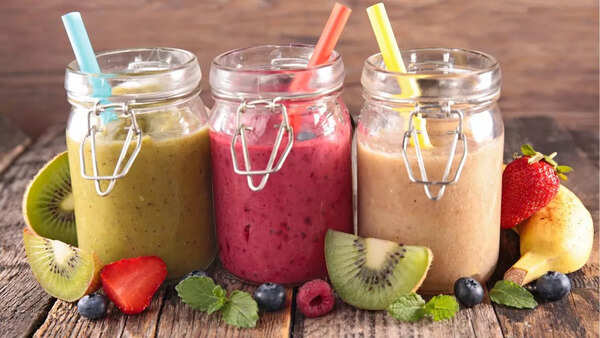Smoothies offer a convenient and nutrient-rich breakfast option, ideal for busy mornings. Packed with fruits, vegetables, and other healthy ingredients, they can be easily customized to suit individual tastes and dietary needs. Whether your goal is to boost energy levels, manage weight, or simply enjoy a healthful start to the day, smoothies can be a valuable addition to your routine. However, it's important to be aware of potential drawbacks.
A smoothie is essentially a chilled, blended beverage. It typically combines fruits, vegetables, and a liquid base (such as milk or water) to achieve a smooth, creamy consistency.
Some popular ingredients include:

Mindful ingredient selection and portion control can effectively minimize these risks.

Green Smoothies: These combine greens like spinach, kale, or arugula with fruits and vegetables to mask any bitter flavors.
Fruit Smoothies: Made with a variety of fresh, canned, or frozen fruits such as bananas and berries.
Protein Smoothies: Designed to boost protein intake using animal or plant-based sources like milk, yogurt, or protein powder. These are popular among fitness enthusiasts for muscle building and recovery.
Newer articles
Older articles
 Emma Raducanu Shuts Down Carlos Alcaraz Dating Rumors with Playful Wimbledon Press Conference Quip
Emma Raducanu Shuts Down Carlos Alcaraz Dating Rumors with Playful Wimbledon Press Conference Quip
 Rishabh Pant's "Revolutionary" Cricket Style Hailed by Greg Chappell
Rishabh Pant's "Revolutionary" Cricket Style Hailed by Greg Chappell
 5 Silent Signals of Prediabetes: Recognize the Warning Signs Before a Blood Test
5 Silent Signals of Prediabetes: Recognize the Warning Signs Before a Blood Test
 Wimbledon 2025: Broadcast Guide for India and US Viewers - Dates, Prize Money, and Streaming Details
Wimbledon 2025: Broadcast Guide for India and US Viewers - Dates, Prize Money, and Streaming Details
 Smith Targets Second Test Return After Innovative New York Rehab
Smith Targets Second Test Return After Innovative New York Rehab
 Gavaskar Calls for Kuldeep Yadav's Inclusion in Second Test Amid Bumrah Fitness Doubts, Cites Birmingham Pitch Advantage
Gavaskar Calls for Kuldeep Yadav's Inclusion in Second Test Amid Bumrah Fitness Doubts, Cites Birmingham Pitch Advantage
 Skin Signals: 7 Unexpected Signs of Heart Disease You Should Know
Skin Signals: 7 Unexpected Signs of Heart Disease You Should Know
 India Poised for Dengue Breakthrough as Vaccine Candidate Nears Trial Completion
India Poised for Dengue Breakthrough as Vaccine Candidate Nears Trial Completion
 Science-Backed Steps to a Healthier Heart: 5 Simple Habits for a Stronger You
Science-Backed Steps to a Healthier Heart: 5 Simple Habits for a Stronger You
 FIFA Club World Cup 2025: Upsets, Messi Magic, and 2026 World Cup Concerns Emerge From Group Stage
FIFA Club World Cup 2025: Upsets, Messi Magic, and 2026 World Cup Concerns Emerge From Group Stage